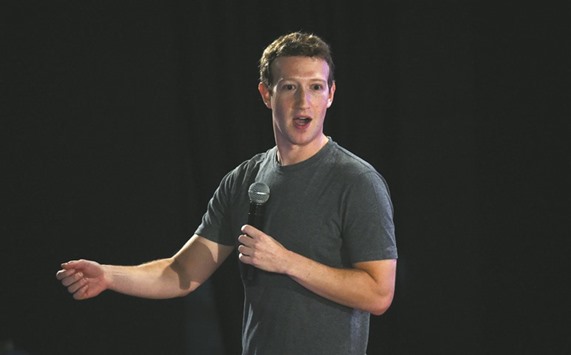Facebook founder Mark Zuckerberg urged India yesterday to approve a controversial plan that would provide a free Internet service to the poor, his latest bid amid an escalating row with authorities.
The head of the social network tried to drum up support for the Free Basics service that offers people without the Internet free access to a handful of websites through mobile phones, in a column in the largest-selling English daily The Times of India.
“If we accept that everyone deserves access to the Internet, then we must surely support free basic Internet services,” the chief executive wrote, comparing the Internet to a library, public healthcare and education.
“Surprisingly, over the last year there’s been a big debate about this in India,” he added.
“Instead of wanting to give people free access to basic Internet services, critics of the programme continue to spread false claims - even if that means leaving behind a billion people.”
Zuckerberg’s personal appeal comes amid fierce criticism from Net neutrality activists who say his plan violates the principle that the whole Internet should be available to all and unrestricted by any one company.
Earlier this month the Telecom Regulatory Authority of India ordered Reliance Communications, the sole mobile operator for the service, to suspend it temporarily without giving a reason.
TRAI also asked in a “consultation paper” whether telecommunications service providers should be allowed to charge different pricing for data usage on websites, applications and platforms. The initial comment period for the Indian consultation paper ends on December 30.
Some 3.2mn people have petitioned the telecoms regulator not to ban Free Basics, formerly named Internet.org. It launched nationwide last month after being trialled in several states.
Several prominent Indian entrepreneurs and members of the tech community have spoken out against Free Basics, arguing that even for poor citizens, no Internet is better than a hand-picked and corporate-controlled web offering.
“We haven’t got a problem with free Internet as long as it’s open to all. Free Basics is just a way of locking in users into the Facebook ecosystem. There’s no Google, no YouTube,” said Mahesh Murthy, a venture capitalist who co-founded Seedfund and marketing startup Pinstorm. “It can’t be that the rich get access to the entire Internet and the poor get access only to Facebook.”
But in an attempt to counter claims “that this will make Internet more like a walled garden,” Facebook has taken out billboards and full-page newspaper adverts defending the initiative.
Free Basics is “at risk of being banned” in India, Facebook said in the adverts, adding that the service aims to help a billion unconnected Indians - mostly living in poor rural areas -to get online.
One advert features a smiling Indian farmer and his family who the it says used new techniques to double his crop yield.
It’s started a “Save Free Basics In India” campaign, asking Indian users to support “digital equality” by filling out a form that shoots an e-mail to regulators. That also has the effect of sending notifications to user’s friends unless they opt out.
“There’s just a tremendous opportunity in India,” Zuckerberg told students at the Indian Institute of Technology in New Delhi in October. “If there are a billion people who are not connected, then this is one of the biggest opportunities I think to help develop the economy here and to help obviate poverty and really lift up a lot of folks.”

In this photograph taken on October 28, , Facebook chief executive and founder Mark Zuckerberg speaks during a ‘town-hall’ meeting at the Indian Institute of Technology (IIT) in New Delhi.
